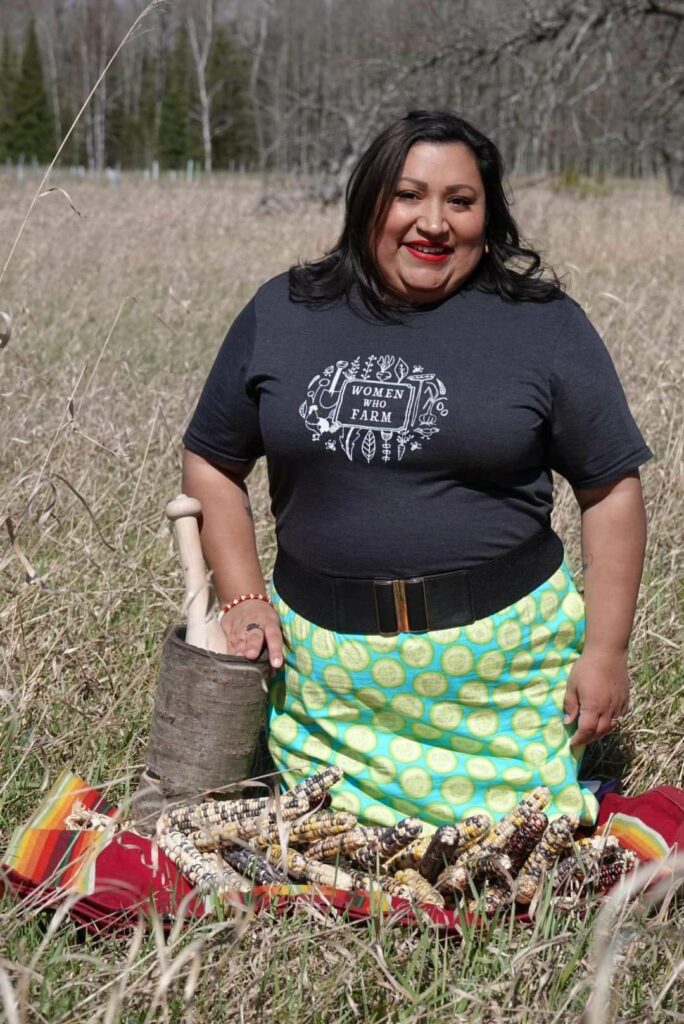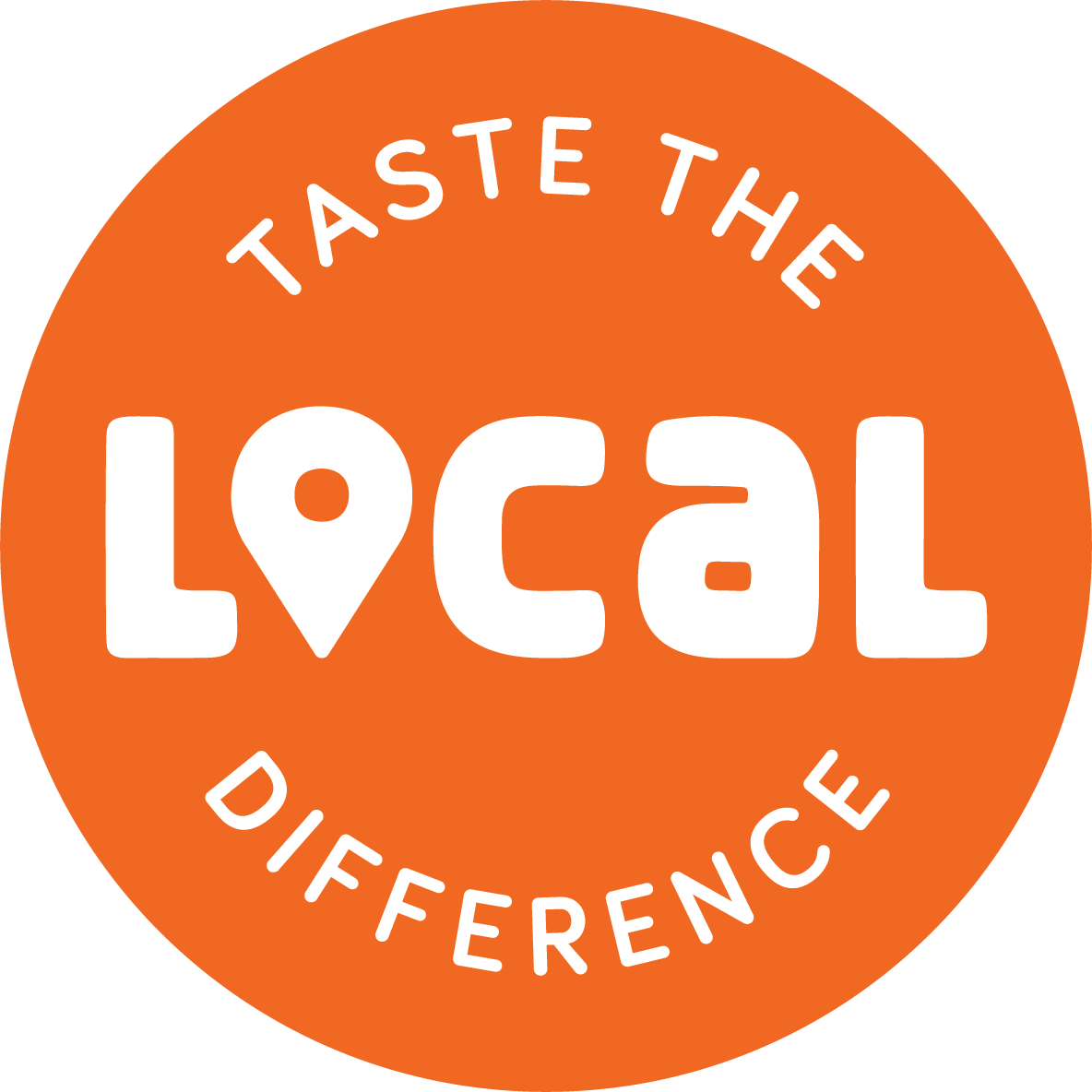
We acknowledge that all of Michigan is the ancestral, traditional, and contemporary lands and waters of Indigenous nations, including the Anishinaabeg — the Three Fires Confederacy of Ojibwe, Odawa, and Potawatomi peoples. October hosts Indigenous Peoples Day, this year on October 10, 2022. Though not yet a national holiday, this day celebrates the cultures and histories of Native American people.
We interviewed Rosebud Bear Schneider, a farmer, producer and community organizer based in Waawiiyatanong (Detroit, MI) to learn more about her relationship with food and Indigenous People’s Day. She is a member of the Anishnaabe, Shawnee, P’urhepecha tribes.
What foods are important to you and why? Describe your relationship with food.
I come from a long line of relatives that nurtured their family and community through food. My childhood was spent in the kitchen watching my grandma or my parents creating meals for us. Whether it was just a regular night or a special occasion, we always had beautifully nutritious meals. We often had wild rice soup with venison or turkey, homemade tortillas and of course, tamales. The three sisters, corn, beans and squash, always had a place on our menu.
Now that I have a family of my own, I have carried on a lot of what my grandma and parents taught me. We always had a small garden, so it’s important to me to grow what I can to feed my family. When it comes to creating community meals I like to go by what’s in season and what’s available in my garden or pantry. I really strive to not have to go to a big grocery store for my ingredients. Of course, that’s not always feasible. Living in an urban area, indigenous folks don’t always have a connection to our cultural ingredients. That’s a big part of what motivates and inspires me to continue to connect my relatives with foods that our ancestors ate.
I want to be able to nourish not just our bodies, but our mind and spirit too. As a farmer and producer, I’m pretty fortunate to have access to land to grow corn, beans and squash and the ability and skills to harvest seasonal foods like maple syrup or forage for wild foods like ramps, staghorn sumac or wild berries.
What does Indigenous People’s Day mean to you?
I’m proud to be Indigenous everyday. It has been beautiful to watch Indigenous communities across Turtle Island reclaim this day in the name of our strength, resilience and the future generations. Even more importantly, it shows the rest of the world that we are still here and are a thriving community deserving of respect.
What do you think everyone should know about Indigenous People’s Day?
There are many ways to celebrate Indigenous People’s Day. Small ways could include learning about the land you live on and recognizing the people that came before you or donating to indigenous-led organizations upholding indigenous peoples rights. Bigger ways could be understanding that the rights of indigenous people matter on the other 364 days of the year. Listen and amplify Indigenous voices that are doing the work in our communities. Get involved in LandBack or Water Protection efforts.
It’s important to know that Indigenous People’s Day is still not considered a federal holiday. There are ongoing efforts to urge Congress to eradicate Columbus Day. Advocacy for Indigenous-led efforts is always needed.
Do you have a favorite Indigenous-owned business that you like to support?
As a farmer and producer, I have developed relationships with many other indigenous farmers, producers and chefs. My dear friend, Spring Alaska of Sakari Farm in Bend, Oregon is a phenomenal farmer and producer that does so much to connect her community with their seasonal foods. Her teas and hot sauces are amazing. For Wild Rice, I love supporting Spirit Lake Native Farms in Fond Du Lac, WI. and for maple products I would be remiss if I didn’t uplift the wonderful work being done and Ziibimijwang and Minogin Market located in Mackinaw City. For a special meal filled with indigenous ingredients, in Detroit, we are lucky to have Chef Meiko Krishok of Pink Flamingo but when I travel outside of Michigan, I love visiting with my sisters Elena Terry of Wild Bearies (WI) and Crystal Wahepepah of Wahpepah’s Kitchen located in Oakland, CA.
Is there anything else you’d like to share?
I have experienced first hand what our reconnection to our cultural foods does to our mind, body and spirit. I will always be dedicated to supporting the health and wellness of our community by educating on the importance of revitalizing Indigenous foodways. My lifelong goal is to give my children and the coming generations the knowledge and skills to live a well-rounded healthy life woven with our ancestral ways.
Rosebud Schneider is a farmer and community organizer based in Waawiiyatanong ( Detroit, MI).
Further Reading:
Explore Indigenous-owned food businesses in our Find Food & Farms Directory here.
